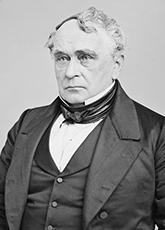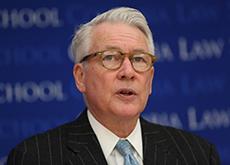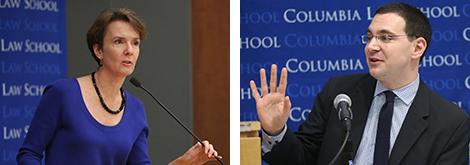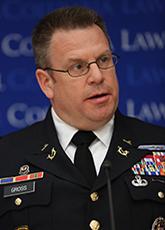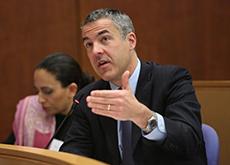Columbia Law School Recognizes 150th Anniversary of Influential Law of War Code
Daylong Conference Featured High-Level Discussions About the Past, Present, and Future of the Laws of War, Which Trace Their Roots to a Document Drafted by Columbia Law School Professor Francis Lieber.
New York, December 5, 2013— Military commanders, humanitarian leaders, government officials, and academics gathered recently to celebrate the 150th anniversary of the first-ever compilation of the laws of war, drafted by Columbia Law School’s pioneer international law scholar, Francis Lieber.
| Francis Lieber |
In 1863, President Abraham Lincoln commissioned Lieber to draft a document that eventually became a foundation for the international codification of the law of armed conflict, including The Hague and Geneva Conventions.
To commemorate the sesquicentennial anniversary of Lieber’s work—and the Law School’s ongoing contributions to the law of armed conflict—Professors Sarah H. Cleveland and Matthew C. Waxman, together with the Human Rights Institute, the Roger Hertog Program on Law and National Security, and the Journal of Transnational Law, organized a daylong conference on Nov. 21. “From Gettysburg to Guantánamo: 150 Years of the Lieber Code and the Law of Armed Conflict” featured high-level discussions about the past, present, and future of the laws of war, including a keynote address by U.S. Army Brigadier General Rich Gross, Legal Counsel to the Chairman of the Joint Chiefs of Staff.
The conference included presentations on the Lieber Code in its Civil War context, the code’s influence around the world, contemporary challenges for securing compliance with the laws of war, and modern efforts to harmonize legal standards in armed conflict.
| Professor Philip C. Bobbitt |
In his introductory remarks to kick off the event, Columbia Law School Professor Philip C. Bobbitt said that for a long time the prevailing view was of “law and war as mutually exclusive.” Today, law plays a crucial role in conflicts, the former senior director at the National Security Council said. Bobbitt listed some of the modern challenges confronting the laws, including: advances in surveillance technology, cyberattacks, detentions of people whom the U.S. government believes cannot be released nor tried successfully in a court of law, and targeted killings.
“In this world, which we are just beginning to glimpse, law and strategy will be united as never before,” said Bobbitt, the Herbert Wechsler Professor of Federal Jurisprudence who, along with Waxman, co-chairs the Hertog Program.
The day’s discussions touched upon some of the work of Columbia Law School’s international and national security law professors who continue the scholarship and practice Lieber began a century and a half ago.
| Professors Sarah H. Cleveland and Matthew C. Waxman |
Waxman, former deputy assistant secretary for defense for detainee affairs under President George W. Bush, is a leading authority on questions about the use of autonomous weapons. Cleveland, faculty director of the Human Rights Institute and a former counselor on international law to the legal adviser in the U.S. State Department under President Barack Obama, is part of a group of scholars and practitioners studying how to extend the more highly developed treaty regime applicable to international armed conflicts to conflicts between states and non-state armed groups, which was a focus of one of the panels.
| Brigadier General Rich Gross |
Gross said in his keynote address that the sesquicentennial was a meaningful anniversary for the Law School and for the military. He called the Lieber Code “absolutely one of the most important” humanitarian works in history.
Lieber based his code on lectures he had been giving on the laws of war at Columbia, which because of their popularity were republished in The New York Times.
| John Fabian Witt |
As part of the sesquicentennial, the Law School produced a special interactive timeline of Lieber’s work that was on display during the conference.
